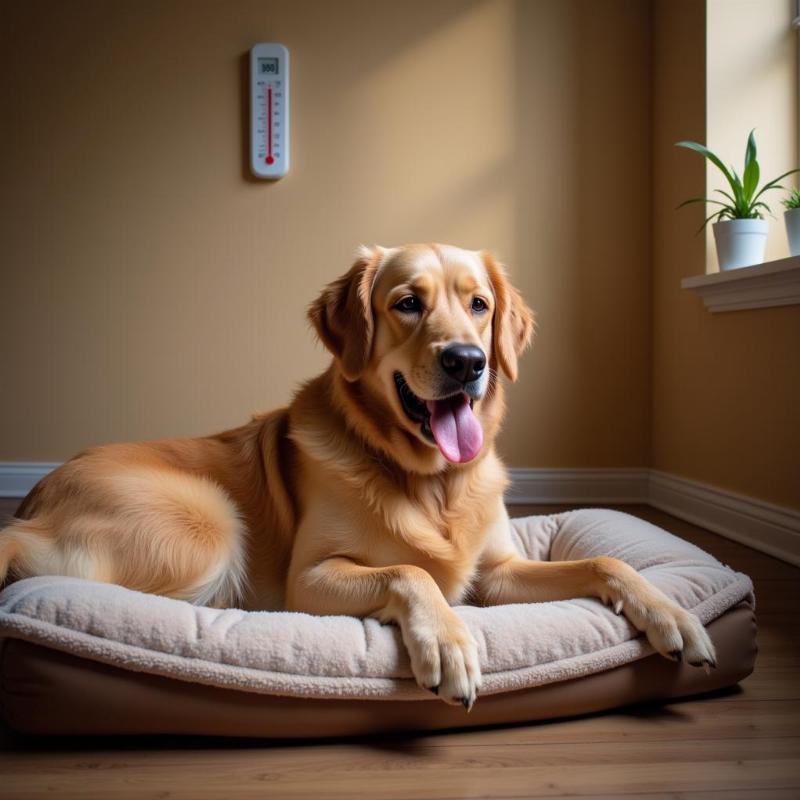If your furry friend suddenly starts panting at night, you’re likely concerned. Is it normal dog behavior, or is something wrong? Understanding why your dog is panting at night is crucial for their well-being. This article will explore the common reasons behind nighttime panting in dogs, from simple explanations like temperature to more serious health concerns, offering guidance and advice tailored for dog owners in the US.
Common Reasons for Nighttime Panting in Dogs
Dogs pant to regulate their body temperature. Is your home too warm? A stuffy room can easily lead to overheating, especially for breeds with thick coats. Consider using air conditioning or a fan, particularly during warmer months. Even in winter, a furnace can make a room too warm for a dog. Ensure proper ventilation and a comfortable sleeping temperature. Is their bed too thick or located in a warm spot? A thinner bed or a cooler location in the house might help.
 Dog Overheating While Sleeping
Dog Overheating While Sleeping
Another common reason is anxiety. Just like humans, dogs experience stress and anxiety. Changes in routine, loud noises (like fireworks, common around holidays in the US), or being alone can trigger panting. A comforting toy, a calming pheromone diffuser, or even a white noise machine can help ease their anxiety. If anxiety is a persistent issue, consult a certified dog trainer or behaviorist. Remember, resources like the American Kennel Club (AKC) offer valuable information and connections to professionals in your area.
Could It Be a Health Issue?
While often benign, panting at night can sometimes indicate underlying health issues. Pain, particularly from arthritis or other joint problems, can cause discomfort and panting, especially as dogs age. Cushing’s disease, a hormonal disorder, and heart or lung problems can also manifest as increased panting. If your dog’s panting is accompanied by other symptoms like coughing, lethargy, changes in appetite or water intake, or seems excessive or unusual, it’s crucial to consult your veterinarian. Early diagnosis and treatment are essential for managing these conditions effectively. Remember, regular check-ups with a licensed veterinarian are a cornerstone of responsible pet ownership in the US.
When to Seek Veterinary Help
If your dog’s panting is sudden, severe, or accompanied by other symptoms like coughing, vomiting, or collapse, seek immediate veterinary attention. These could be signs of a serious condition requiring urgent care. Local emergency animal hospitals are available throughout the US and can provide critical care when needed. Don’t hesitate to contact your veterinarian or an emergency clinic if you’re concerned about your dog’s panting.
Is Your Dog Panting at Night Due to Medications?
Certain medications, particularly steroids, can cause increased panting as a side effect. If your dog recently started a new medication, discuss potential side effects with your veterinarian. They can adjust the dosage or suggest alternatives if necessary.
Creating a Comfortable Sleeping Environment
Ensure your dog has a comfortable and cool sleeping area. A well-ventilated room, a comfortable bed, and access to fresh water are essential. Avoid placing the bed near heating vents or in direct sunlight. A consistent bedtime routine can also help reduce anxiety and promote restful sleep.
Conclusion
Nighttime panting in dogs can stem from various reasons, from simple environmental factors to underlying health concerns. By understanding these potential causes and creating a comfortable environment, you can help your furry friend rest easy. Remember, if you’re concerned about your dog’s panting, consult your veterinarian for professional advice tailored to your dog’s specific needs. Prompt attention and appropriate care are key to ensuring your dog’s health and happiness.
FAQ
- Why does my dog pant at night when it’s not hot? Possible reasons include anxiety, pain, or underlying health issues.
- Is it normal for older dogs to pant more at night? Older dogs may pant more due to age-related conditions like arthritis or heart problems.
- When should I be concerned about my dog’s panting? If the panting is sudden, severe, accompanied by other symptoms, or seems unusual, consult your veterinarian.
- How can I make my dog more comfortable at night? Ensure a cool, comfortable sleeping area, provide fresh water, and establish a calming bedtime routine.
- Can medications cause panting in dogs? Yes, certain medications, such as steroids, can cause increased panting.
- What are some signs of anxiety in dogs? Panting, pacing, whining, destructive behavior, and changes in appetite or sleep patterns.
- How can I help my anxious dog? Create a safe space, use calming aids, and consult a certified dog trainer or behaviorist.
Beautdogs.us is your premier resource for comprehensive dog care information in the US. We offer expert advice on everything from breed-specific needs to the latest in pet care trends. Whether you’re a new dog owner or a seasoned pro, Beautdogs.us is your trusted source for all things canine. Contact us today for expert advice! Email: [email protected], Phone: +1 501-555-7529.